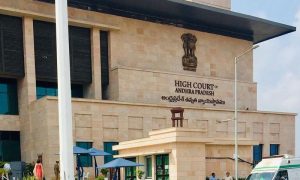
The Hon’ble High Court of Andhra Pradesh vide its order dated 20.10.2022 in M/s Esveeaar Distilleries Private Limited Vs. Assistant Commissioner (State Tax), Tirupati -II Circle, Tirupati & Four Others in Writ Petition No. 15534 of 2022, held that Alcoholic Liquor for Human Consumption does not constitute food and food products. Hence, would be liable to Tax at 18% not 5%. Further it was held that the Notification no. 6/2021 dated 30.09.2021 being clarificatory in nature, would be applicable retrospectively.
Facts of the Case: –
- The petitioner in the instant matter is a manufacturer of Indian Made Foreign liquor having its distillery at Karakambadi Village, Chittoor District and is a franchisee of M/s.United Spirits Limited, Bangalore for manufacture of “McDowell” brand alcoholic beverages like rum, whisky and brandy.
- The petitioner purchases extra neutral alcohol from various distilleries, food flavours, special spirits and caramel from registered dealers situated within the State of Andhra Pradesh as well as from dealers located outside the State of Andhra Pradesh.
- That an assessment was carried on by Respondents for the Tax Period 2017-2018, 2018-2019 & 2019-2020 and CGST amounting to Rs. 24,94,104/- along with penalty and interest under CGST & IGST were levied.
- The petitioner has challenged it on the ground that the job work charges relatable to manufacture of Alcoholic liquor in view of Notification No.6/2021-Central Tax (Rate) dated 30.09.2021 issued by the Department of Revenue, Ministry of Finance, Government of India, published in the gazette on 30.09.2021, at the rate of 18% as against 5% is illegal and contrary to law.
Petitioner’s Submissions: –
- Referring to Notification No. 11/2017 dated 28.06.2017, Notification No. 31/2017 dated 13.10.2017 and Notification No. 06/2021 dated 30.09.2021, it was submitted on the behalf of the petitioner that reading of aforesaid notifications would clearly establish that for the work done by the petitioner, it has to pay tax @ 5% tax and imposition of 18% by the assessing authority is bad in law.
- It was submitted that the product manufactured by the petitioner i.e., alcohol/beverages/liquor falls under Chapter 22 “Food and food products” of the First Schedule to the Customs Tariff Act, therefore, the respondents can only demand payment of tax at 5% and not at 18%.
- That the Notification No. 06/2021 dated 30.09.2021 can only be prospective in operation but not retrospective, as no notification was published in the Gazette till 30.09.2021 and the said notification 06/2021 came into effect from 01.10.2021.
Respondents’ Submissions: –
- It was submitted on the behalf of the respondents that when the issue involves disputed question of fact, the proper remedy for the petitioner is to file an appeal.
- Further referring to Notification 11/2017, 06/2021 and Notification No. 31/2017, it was submitted the contention raised on the behalf the Petitioner that Notification 11/2017 is substituted by Notification No. 06/2021, is not correct.
- It was contended that only ‘food and food products’ falling under Chapter 1 to 22 in the First Schedule only are covered and the same would not cover alcohol.
- It was also submitted that notification is silent as to whether it is prospective or retrospective in operation, it is an established principle of law that the same would be retrospective in operation and the petitioner has to pay 18% tax instead of 5%.
Held: –
- The Hon’ble Court taking note of the findings of the assessing authority that ‘Similarly it would have never been the intention of law to exempt expensive items like “Alcoholic Liquor” under the category of food and food products even through the same is for human consumption. Further the notification no:6 dt: 30-9-2021 is clarificatory in nature for the above position, therefore the objection is rejected as not tenable.”’, found that it is to be noted that Government of India issued Notification No. 11/2017 on 28.06.2017, in exercise of the power conferred by Sub-section (1) of Section 9, Sub-section (1) of Section 11, Sub-section (5) of Section 15 and Sub-section (1) of Section 16 of the C.G.S.T. Act, 2017.
- Further it was found the word “food and food products” or “alcohol” i.e., beverages was not included under the Heading 9988 but however, tax payable for products mentioned therein was shown as “2.5” (2.5% + 2.5%).
- Later on, on 13.10.2017, Notification No.31/2017 whereby, in item (i), after sub-item (e), all food and food products falling under Chapters 1 to 22 in the First Schedule to the Customs Tariff Act, 1975 was added. However, the tax to be paid remained unaltered at 5%.
- It was fount that on the behalf of the petitioner Chapter 22 dealing with “Beverages, spirits and vinegar” was referred, to contend that as liquor forms part of Chapter 22, it was included, treating it as food. However, on 30.09.2021, Notification No.6/2021 came to be issued making further amendments to Notification No.11/2017 whereby, at Serial No. 26, the tax initially paid by the petitioner @5% was enhanced to 18% in respect of the nature of the work done by the petitioner.
- Further it was noted by the Hon’ble Court that the said Notification No. 06/2021 does not substitute earlier notification issued by the Government. It only clarifies the earlier notification by incorporating a clause, having regard to the law laid down by the Hon’ble Supreme Court.
- It was found by the Hon’ble Court that only food and food products, as reflected in Chapters 1 to 22 in the First Schedule, are eligible for payment of less tax, however, it is to be seen that whether alcoholic liquor for human consumption can be considered as food for the purpose of levying tax at lower rate under the said notification?
- Further it is an admitted fact that there is no definition of “food and food products” under the Act but at the same time, whatever consumed by human beings cannot be construed as “food and food products” for the purpose of exemption under G.S.T.
- Referring to the Judgment of Hon’ble Supreme Court in Collector of Central Excise Vs Parle Exports Pvt Ltd wherein, it was held that ‘it will never be the intention of legislature to exempt expensive items like alcoholic liquor under the category of food and food products though the same is for human consumption’, it was observed by the Hon’ble Court that in view of the aforesaid judgment it is to be seen whether the petitioner is entitled to any exemption and whether any exemption can be granted for the past transactions.
- Further it was noted by the Hon’ble Court that in the 45th GST Council meeting, it was clarified that food and food products in the said entry excludes alcoholic beverages for human consumption. It also states that in common parlance also, alcoholic liquor is not considered as a food. As such, services by way of job work in relation to manufacture of alcoholic liquor for human consumption are not eligible for GST @ 5% prescribed under the said entry.
- Further the GST Council recommended that such job work would attract GST at the rate of 18%. That considering the contention on the behalf of the petitioner that ‘the recommendations of the GST Council are not binding and they are only directions’, it was found that even if the contention of the petitioner is accepted, from the plain reading of the item in dispute, it cannot be treated as article of food. Besides, it cannot be treated as an item of food for many reasons, more particularly, for the advertisements carried on the item that consumption of the same would be injurious to health, etc. Therefore, the argument of the petitioner that since alcoholic liquor found in entry 26 in terms of Notification No.11/2017, dated 28.06.2017, and thereafter, has to be treated as an article of food and liable to be taxed at 5% (2.5% C.G.S.T. & 2.5% S.G.S.T.) cannot be accepted. Hence, the same is required to be taxed at 18%.
- Moreover, in the Notification No. 6/2021, dated 30.09.2021, published in the Gazette on 30.09.2021 itself incorporates services by way of job work in relation to manufacture of alcoholic liquor for human consumption as item No.(ica) in Column No.3 of Serial No.26 and the rate of tax is mentioned @ 9% (i.e., 9%+9%=18%). Since the manufacture by the petitioner relates to alcohol for human consumption by way of job work, the petitioner is liable to pay tax at 18%.
- Thereafter, the Hon’ble Court considering the next question that ‘Whether the petitioner is liable to pay tax at 18% with prospective or retrospective effect’, found that as held above “alcoholic liquor for human consumption” does not constitute food or food product falling within Chapters 1 to 22 of First Schedule of Customs Tariff Act, 1975, and the petitioner would be liable to pay tax at the rate of 18%. Apart from that, it is also to be noticed that at no point of time, any exemption was specifically granted to “alcoholic liquor for human consumption”. Neither the notification nor the items mentioned in Chapters 1 to 22 spell out clearly that “alcoholic liquor for human consumption” as food or food product.
- It was found that the petitioner, on its own, started claiming exemption, which lead to issuance of notification No.6/2021. Though the notification was published in Gazette on 30.09.2021, but this being clarificatory in nature, it has to be retrospective in operation.
- Lastly, the Hon’ble Court referring to the judgment of Hon’ble Supreme Court in CIT v Vatika Township Pvt Ltd wherein, it was held that “If a new Act is ‘to explain’ an earlier Act, it would be without object unless construed retrospective. An explanatory Act is generally passed to supply an obvious omission or to clear up doubts as to the meaning of the previous Act”, found that in view of law laid down by Hon’ble Supreme Court and as the notification issued herein being of clarificatory in nature it is retrospective in operation.
The Hon’ble High Court with the above findings, dismissed the Writ Petition finding no merit in the contentions raised.



